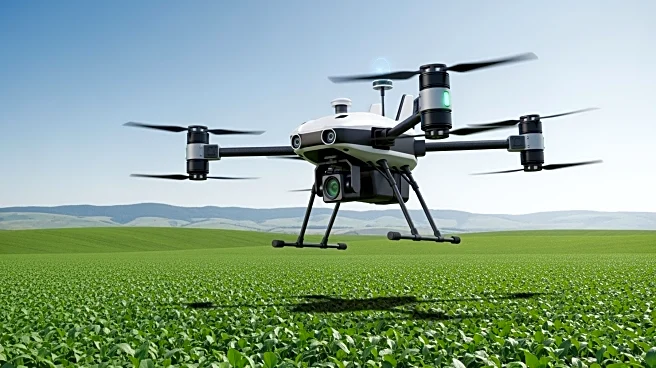What's Happening?
Artificial intelligence and robotics are transforming agriculture into a data-driven ecosystem, enhancing precision, sustainability, and automation. A study titled 'AI and Robotics in Agriculture: A Systematic
and Quantitative Review of Research Trends (2015–2025)' highlights the technological evolution in agriculture over the past decade. The study, based on over 10,000 publications, identifies key technologies and challenges in integrating AI into farming. Drones and ground robots are leading innovations, with drones accounting for 40 to 60 percent of agricultural robotics research. The study emphasizes the shift towards autonomous systems capable of learning and adapting without human intervention. China, India, and the United States are at the forefront of AI and robotic research in agriculture, while other regions lag due to disparities in infrastructure and investment.
Why It's Important?
The integration of AI and robotics in agriculture is crucial for addressing global challenges such as climate change, labor shortages, and food security. By automating farming processes, these technologies can increase efficiency and productivity, potentially reducing costs and environmental impact. However, the uneven distribution of technological advancements highlights the need for equitable access to these innovations. The study underscores the importance of developing inclusive policies to ensure small-scale farmers are not left behind. The ethical implications, such as labor displacement and data privacy, must be addressed to prevent exacerbating unemployment and inequality in regions dependent on agriculture.
What's Next?
The study proposes a strategic roadmap for sustainable agricultural AI, advocating for domain-adaptive models, explainable AI frameworks, and energy-efficient technologies. It calls for international collaboration to create shared data frameworks and open-access repositories, promoting innovation while ensuring ethical use. The recommendations aim to align agricultural automation with global sustainability goals, focusing on environmental resilience, social equity, and data accountability. As AI continues to evolve, stakeholders must prioritize inclusive technology transfer and capacity building to support responsible adoption in developing regions.
Beyond the Headlines
The study highlights the need for policy frameworks to support AI adoption responsibly, addressing concerns such as labor displacement and technology inequality. It emphasizes the importance of developing climate-smart AI solutions to optimize soil health, water efficiency, and carbon management. The integration of swarm robotics and multi-agent reinforcement learning could enable coordinated decision-making among robotic systems, enhancing large-scale farming operations. These advancements could lead to long-term shifts in agricultural practices, promoting sustainability and resilience in the face of global challenges.











